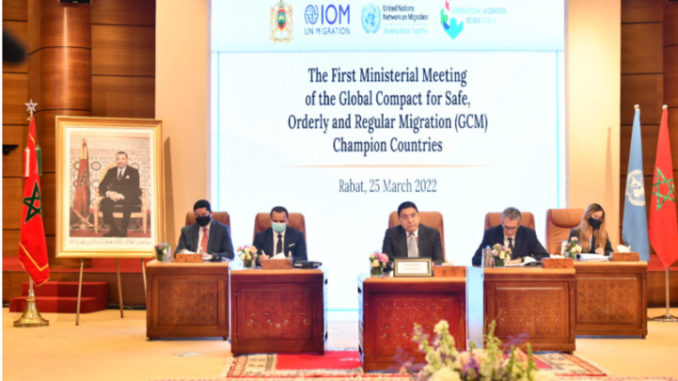
Moroccan Minister of Foreign Affairs Nasser Bourita called Friday from Rabat, for encouraging regular migration and reducing the vulnerabilities of migrants.
Speaking at the opening of the first ministerial meeting of the champion countries of the implementation of the Marrakech Pact on Migration, Bourita stressed the need to “promote inclusive societies, encourage regular migration, reduce the vulnerabilities of migrants, while promoting exchanges, cooperation and partnerships, as well as further interaction between the Marrakech Pact and the 2030 Agenda”.
The Minister, who said that “migration can no longer be seen as a stigma, nor can the migrant be perceived as a threat”, noted that the need for a cooperative framework on migration has never been more evident. He added that while many structural and cyclical challenges and deficits remain, the Pact offers a roadmap for overcoming some and addressing others.
Therefore, he added, this conference “must be an opportunity for us to carry out specific actions: to provide, based on the sharing of our respective experiences, concrete guidelines for advancing the Pact, and to create momentum ahead of the first International Migration Review Forum, to be held in New York in May 2022”.
Referring to the designation of the Kingdom as a champion country of the implementation of the Marrakech Pact, he said that “our commitment is, indeed, a consistent application of our position on migration and the principles we defend”.
He insisted on the need to expand the group of champion countries to other states, which speak the same language, that of the reference contained in the Marrakech Pact.
“We want to go further; by reiterating the desire to see a Special Envoy of the African Union for Migration materialize; by replicating the experience of the Observatory in other continents; or, by considering the creation in academic institutions and universities of the champion countries, of a network of research centers on migration that would work with the IOM. It could focus initially on the issue of brain drain,” he said.
The conference, held by videoconference, was attended by some 17 ministers and representatives of world organizations, who discussed ways of implementing the Marrakech Pact, adopted in December 2018.
The conference highlighted by the adoption of a Declaration that praised the role of King Mohammed VI as the African leader on migration and reiterated the full support to the Global Compact on Migration (Marrakech Pact).
“We highly commend His Majesty King Mohammed VI’s role as African Leader on the issue of Migration and His strong commitment through the African Agenda on Migration, a roadmap with a clear vision for the continent and the creation of the African Migration Observatory, hosted in Rabat,” the participants said in the Declaration.
“We have gathered to reiterate our full support to the GCM, and commitment to keep working together towards a successful and robust implementation of the Global Compact,” they stressed, saying they were convinced that “international cooperation and the sharing of best practices in the field of international migration in all its dimensions should be the norm, rather than the exception.”
Adopted at the Intergovernmental Conference in Marrakech on December 2018, the Global Compact for Safe, Orderly, and Regular Migration (GCM) represents a major contribution of multilateralism and a collective commitment to improving cooperation to address the challenges and harness the opportunities of international migration and human mobility, through a comprehensive cooperative framework anchored in its vision and guiding principles.
“Amid emerging transitions and in the context of the Covid-19 pandemic, the vision of the GCM must be promoted in order to facilitate and recognize the benefits of safe, orderly and regular migration for everyone,” they insisted.
They recalled that the Champions’ initiative is an open group of States of origin, transit, destination and return committed to the effective implementation of the GCM, in the pursuit of achieving the Sustainable Development Goals and called on other States to join this collective initiative to broaden the platform of Champions representing the full range of migration realities reflected in the GCM.
They also commended the continuous support of the United Nations Network on Migration in the form of guidance and practical tools to accelerate GCM implementation, and its efforts to facilitate collective learning, promote the cross-fertilization of ideas, disseminate information, and the exchange of good practices.
The Rabat Declaration welcomed the report of the Secretary-General on the implementation of the GCM that shows how governments can put in place laws, policies and practices consistent with the commitments and guiding principles of the Global Compact and how they can lead by example, and fulfil the promise of the Global Compact, in accordance with its vision and guiding principles.
